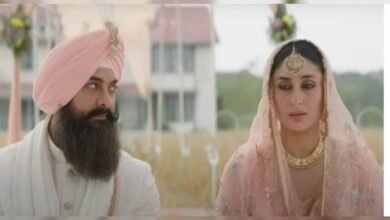Thank You For Coming Review: More Erratic Than Erotic

Bhumi, Shibani and Dolly in a still from the film. (Courtesy: YouTube)
At under two hours, Karan Boolani’s Thank You for Coming is by no stretch of the imagination a long film. But the frothy jabber-fest of a sex comedy, written by Radhika Anand and stand-up comic Prashasti Singh, quickly outlives its welcome.
The film not only fails to rid itself of its flabby frivolity but it also makes the audience wade through massive amounts of verbiage that often lapses into unintelligible blabber. Laboured, hackneyed and exhausting, Thank You for Coming makes the same point over and over again until it has absolutely nothing, fresh or otherwise, left to say.
It takes an eternity to find some sort of rhythm. When it eventually does – the film’s second half is far better than the first, which isn’t necessarily saying much given how wayward the kick-off is – it moves forward (and sometimes even backwards) only in fits and starts, goes into repetitive loops, froths at the mouth and gets exceedingly antsy.
More erratic than erotic, the film, produced by Anil Kapoor Films and Communication Network and Balaji Motion Pictures, delivers an essential anti-patriarchy message but does its cause no good by adopting methods that are so unsubtle that they could put an over-zealous soapbox orator to shame and put off people who might be inclined to hear the film out considering the thrust of its messaging.
All that Thank You for Coming is trying to tell us is that self-love is the best love if you are a woman and that shame and guilt are the first things that are to be thrown out the window if one is looking for true happiness. All the loquacity around that assertion is often pointless and tedious. Lack of restraint and skin-deep arguments rob the film of genuine impact.
It employs many different ways to put the avowed point across as the female protagonist, the mishap-prone Kanika Kapoor (Bhumi Pednekar), wends her way through her convoluted and perilous love life that yields no real pleasure. She holds on to her two best friends, divorcee Tina Das (Shibani Bedi) and the married Pallavi Khanna (Dolly Singh).
Tina, whose daughter Rabeya (Saloni Daini) has to reckon with her share of teenage angst, is a single mother. She left her husband when she found out that he was cheating on her. Pallavi appears to be happily married to the amiable Karan (Gautmik) but the understanding between the two evaporates when they get into an argument.
Kanika’s is the ultimate male-free family. She lives with her mother Dr Bina Kapoor (Natasha Rastogi), a gynaecologist who gave birth to her out of wedlock, and maternal grandmother (Dolly Ahluwalia). The three generations of women share a roof but do not agree with each other on most matters. Peace is maintained in the household because they believe in the live-and-let-live credo.
Kanika’s doctor-mom is of the belief that marriage is at best a tick mark in a woman’s life. The heroine, forever on the lookout for a frog to kiss and turn into a Prince Charming, decides she wants that tick mark for whatever it is worth. She decides to get engaged to an unassuming businessman, Jeevan Anand (Pradhuman Singh), although Kanika does not exactly take a shine to him. Her friends are bewildered.
Jeevan isn’t the only ‘frog’ in Kanika’s life. There are several others, including an ageing professor (Anil Kapoor in a special appearance), who gifts books of Gulzar’s poetry to girls half his age. Arjun (Karan Kundrra) and Rahul (Sushant Digvikar) are also in her orbit. But orgasm eludes her.
And then, one boozy night, it happens but the sloshed-out-of-her-wits Kanika has no idea who the man was. The second half of the film is devoted to the woman’s search of the lover who did the trick and vanished. The search takes her from door to door.
Here on, the film beats about the bush (with greater intent than before) until it finds a clearing – the school auditorium where, 17 years ago, Kanika was summarily humiliated because she blurted out how babies are made – from where the woman, now 32, can make a ‘smash patriarchy’ declaration.
Thank You for Coming does not indulge in relentless male-bashing. The men around Kanika seem to be rather harmless, if somewhat confused. It is two women – Rushi Kalra (Shehnaaz Gill) and Neha (Kusha Kapila) – who are more intent on queering the pitch for her as she tries to find answers to the questions swirling in her head and heart.
Somebody tells Bhumi Pednekar’s character that she is at the heart of the show. Everyone else is a side actor. They indeed are. Pednekar is in virtually every scene. She is called upon to go full-throttle and refrain from pausing for breath, but she manages to retain her composure through the mayhem that is triggered by her quest for a happily ever after ending.
Shibani Bedi, Dolly Singh and Gautmik do have their moments in the sun, but the rest of the cast are relegated to the background. Kusha Kapila, in a blink-and-you-miss role, is worst done by. Shehnaaz Gill, notwithstanding the fact that the character she plays claims that she is everywhere because she is happiness, fares only marginally better.
The seasoned ones in the cast, including guest star Anil Kapoor, have more substantial roles. Natasha Rastogi in the role of the heroine’s mother and Dolly Ahluwalia as her Naani rise above the frequently deafening din.
That is where the rub lies Thank You for Coming is so screechy and loud that the actors have to not only outtalk each other but also, at times, shout each other down. If there is a takeaway from this film, it is this: talk is cheap, insight is not. There is plenty of the former in Thank You for Coming, little of the latter.
Thank You for Coming is like a raucous, full-on party where the surround sound is generally fine but the food is stale.
Cast:
Bhumi Pednekar, Shibani Bedi, Shehnaaz Gill, Kusha Kapila, Dolly Singh
Director:
Karan Boolani
Source link





